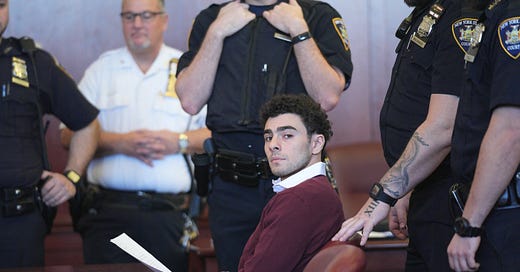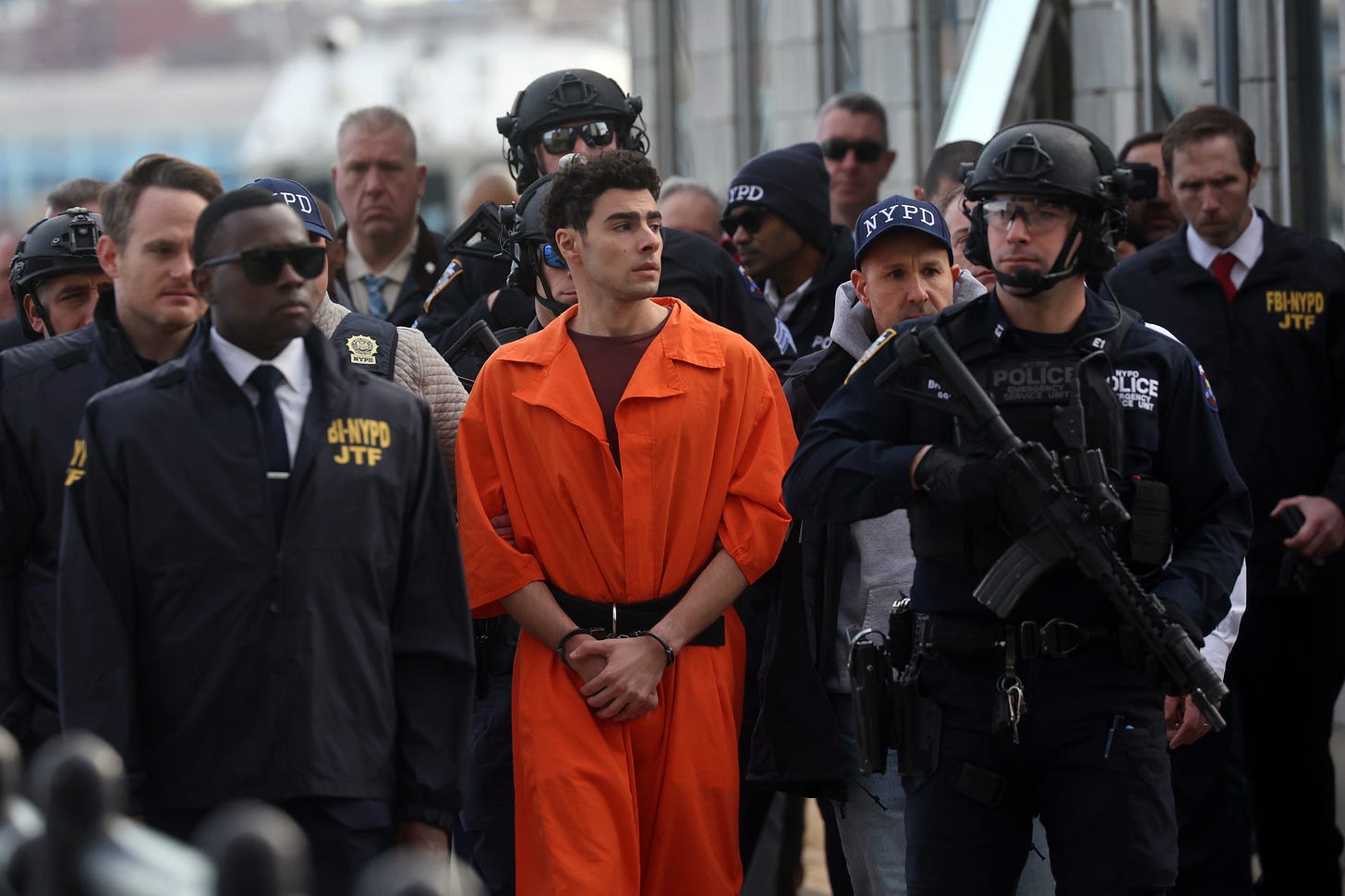Class, Policing, and Luigi Mangione
How an alleged killer is shaping conversations in New York
In 2017, two NYPD detectives were accused of raping a teen girl in a parking lot in Brooklyn while she was detained and in their custody. The verdict, which was reached about two years later, was five years of probation for both of the men who had pleaded guilty.
Why didn’t they receive jail time? Brooklyn District Attorney Eric Gonzalez expressed his desire to have the men serve jail time for their crime, but stated he was restricted by the law, which at the time had a loophole that allowed police officers to claim “sex” could be consensual with individuals in their custody.
“This incident led to a change in New York law, closing a loophole that allowed officers to claim that sex with a detainee was consensual. Unfortunately, we could not apply that new law retroactively. While my office recommended prison time, we accept the court's sentence,” Gonzalez said.
I was working as a Legislative Director in the New York City Council at the time this horrific rape occurred and it happened in the district where I worked. Immediately, I sprang into action with my coworkers and we researched the related Penal Code, which—at the time—stated that sexual contact with individuals who were incarcerated was forbidden since those individuals could not give consent to corrections officers. However, that same standard wasn’t applied to police officers, which allowed a loophole that many felt was an intentional omission that was granted to give police even more power.
I worked on an op-ed for my then-boss that explored this glaring omission. We introduced a Local Law that would explicitly prohibit sexual contact between police and peace officers and individuals in their custody, as well as a resolution that called on state lawmakers to close the loophole. Ultimately, officials stated it was this loophole (which has since been changed) that prevented justice from being fully served for this heinous crime.
In that terrible incident, New York law changed the trajectory of a case because of stringent requirements related to specific charges. If standards must be followed, even at the expense of justice, when does protocol change? Do District Attorneys abide by the law’s requirements for charges, even when disagreeing with its parameters? In this tragic case, that was the standard response by those with power. The law determined the charge.
The parameters of charges have often been determined by the language of the law. But is that always the case? When do District Attorneys pursue more aggressive charges? Why were the two NYPD detectives granted probation? Who is charged according to the letter of the law and who isn’t?
In New York, those questions have long been relevant, but there are new eyes watching the city and state’s unequal applications of justice now, especially after the infamous spectacle of Luigi Mangione’s perp walk, which was attended by Mayor Eric Adams who himself has been indicted for bribery, campaign finance, and conspiracy offenses.
New York law has a very stringent requirement for murder in the first-degree charges, which include the murder of a police officer or other uniformed officials, or an act of terror. It seems New York’s murder in the second-degree is more equivalent to other states’ murder in the first-degree charges.
So why is Mangione being charged with murder in the first degree “in furtherance of terrorism”—and what’s going to happen next?
The Internet and the Aftermath
Mangione looks vaguely like one of my relatives. With his dark curly hair and thick eyebrows, he has become an archetype, at least physically, of Italian machismo.
Online, people have posted folk songs and painted tributes. There are countless photo collages of Mangione with soundtracks—most frequently accompanied by the Britney Spears lyrics, “Mama, I’m in love with a criminal.”
Twenty-one days before Christmas, Mangione allegedly murdered UnitedHealthcare CEO Brian Thompson in Midtown Manhattan. The unsealed criminal complaint states that Luigi Mangione planned this over months in order to “initiate a public discussion about the healthcare industry.”
From the U.S. Department of Justice’s Press Release, here’s the alleged timeline:
“In the early morning hours of Dec. 4, Mangione traveled by bicycle from the Upper West Side to the area around West 54th Street and Sixth Avenue. At approximately 6:45 a.m., Mangione strategically placed himself in between two cars on West 54th Street, and as the victim passed by, Mangione walked up behind the victim and fired several gunshots from a 9mm pistol causing the victim’s death. The pistol was equipped with what appeared to be a firearm sound suppressor or silencer. After the murder, Mangione fled on his bicycle northbound through Central Park and ultimately back to the Upper West Side.
On Dec. 9, Mangione was arrested in Altoona, Pennsylvania, while he sat in a fast-food restaurant after being recognized by one of the restaurant’s workers. Members of the Altoona Police Department confronted Mangione, who provided the same false identification that he used when checking into the Upper West Side hostel. Mangione was also found in possession of, among other things, a 9mm pistol and a sound suppressor consistent with the weapon used to kill the victim.”
Mangione faces multiple charges. But the most serious one, and the one that has spurred questions, is the first-degree murder charges with the terrorism designation.
To say the news of Mangione went viral is an understatement. I haven’t spoken to a single person who didn’t hear about it. It was covered by the left and the right. Interestingly, Reddit, Yahoo, YouTube, Facebook, and Instagram all had similar content. If the medium is the message, then all of social media had, seemingly, the same message. Everyone, it seemed, online and offline was informed of the incident and the arrest.
The charges now have added another layer of information and debate.
Mangione has the first-degree murder charge, as well as second-degree murder charges. In the New York Times, Claire Finkelstein, a professor of law and philosophy at the University of Pennsylvania states that those second-degree charges were included because “if for any reason the jury doesn’t find first-degree murder, they can convict on second-degree murder.”
It seems that there is a hedging of bets happening since the first-degree murder charge may be outside of the parameters of the law. So why is that first-degree charge so vital to authorities?
Plight of the People: Healthcare in America
In 2023, Casey McIntyre passed away from ovarian cancer. She wrote on social media that to celebrate her life, she “arranged to buy up others' medical debt and then destroy the debt.” She said that she had access to “the best medical care” and was “keenly aware that so many in our country don't have access to good care.”
She partnered with RIP Medical Debt, which buys medical debt at a discount and pays off debt for people, and had a “debt jubilee.”
She has raised over one million dollars. (Disclaimer: I made a small donation to the cause. If you’re able to, you should consider it, too.)
There are estimates that four in 10 of households in America owe some healthcare debt.

Other countries have long ridiculed America’s healthcare system. Even our media’s “feel good” stories usually expose something deeper, and poignantly tragic, about the inequities of our healthcare system.
In 2019, Home Depot workers received national attention after they made a walker for a two-year-old boy. The story begins, “Imagine your child having a disorder that impacts his motor skills, such as walking, and not knowing if your insurance would cover a basic item he needs to help him walk.”
Healthcare costs strain our social safety net. Too often, individuals must resort to philanthropy to pay for their care. Communities come together to help others or strangers reach out to other strangers online in a last-ditch effort for assistance. GoFundMe has become a go-to resource for people struggling with medical bills.
But this highlights the systemic issues of a broken healthcare matrix. Former GoFundMe CEO Rob Solomon has reportedly said that he “would love nothing more than for ‘medical’ to not be a category on GoFundMe.”
UnitedHealthcare Statistics
UnitedHealthcare, which insurers about 50 million people, reportedly denies more claims that any other healthcare company in the nation. The company has faced well-documented scrutiny for denying claims.
In 2023, a STAT investigation highlighted how United “pressured its medical staff to cut off payments for seriously ill patients in lockstep with a computer algorithm’s calculations, denying rehabilitation care for older and disabled Americans as profits soared.”
ProPublica wrote about a college student who had yearly medical bills of approximately $2 million for ulcerative colitis and who fought back with a lawsuit against United after they refused to pay for this individual’s treatment.
Before his death, CEO Brian Thompson received a yearly compensation package of over $10 million.
Class Conversations
Mangione is from a wealthy family in Maryland. His grandfather was a very successful real estate developer. Some people online have questioned why he cared so much about healthcare if he himself could (seemingly) personally afford it.
It is well-documented that Mangione suffered from back pain and there is speculation that his exposure to that pain and the healthcare system shaped his motives.
After Mangione’s alleged actions, Jacobin interviewed Senator Bernie Sanders and asked him his thoughts. Sanders has been an ardent support of Medicare for All and has stated repeatedly that healthcare is a “human right.” He also wants to eliminate the $81 billion of medical debt that impacts 79 million Americans.
In the Jacobin interview, Bernie Sanders said this:
“It goes without saying that killing anybody — this guy happened to be a father of two kids. You don’t kill people. It’s abhorrent. I condemn it wholeheartedly. It was a terrible act.
But what it did show online is that many, many people are furious at the health insurance companies who make huge profits denying them and their families the health care that they desperately need. The stories unfold all the time: ‘My mother was on cancer treatment and I couldn’t get care for her. The insurance company rejected it. Some bureaucrat rejected it. She died.’ Or ‘My kid is suffering because we can’t get the prescription drugs that we need, they rejected the doctor’s request.’
What you’re seeing, the outpouring of anger at the insurance companies, is a reflection of how people feel about the current health care system. It is broken. It is cruel. I mentioned to you: sixty thousand people a year die because they don’t get to a doctor when they should. Sixty thousand people!
And here’s another statistic that I’ll throw out, which is never talked about: it’s not only that our life expectancy is lower than virtually every other wealthy country, it’s that if you are working-class, you’re going to live five to ten years shorter than people who are wealthy.”
The Return of Satire in an Unequal Economy
In 1729, Jonathan Swift published “A Modest Proposal,” which sardonically suggested that poor people feed their children to the rich for money. This was in no way serious, and its gruesome “solution” was offered to highlight the gross inequities between the rich and the poor.
Satire is a powerful vehicle for highlighting any truth, especially when it comes class disparities. Jesters were the only ones who could ridicule the king. Satire allows for an expression of our deepest truths.
Some are stating online that this feels like a turning point. It seems policy proposals are being discussed though a return to satire to highlight the gross class disparities and unhappiness with the current healthcare options.
During the Trump administration, as a response to his hateful agenda, many advocates were so fearful of the administration that there was little room for nuance. Movements and slogans were literal. In an effort to not be misinterpreted or accidentally aligned with Trump's hateful rhetoric, rallying cries were hyper-literal. The stakes were so high during this politicized time that there wasn't time or space for satire. This mostly continued throughout the Biden administration.
(Trump himself promised a better healthcare option at one point, though he has potentially exacerbated rural doctor shortages, which I’ve written about previously. Trump has shown little genuine interest in reforming the system.)
Now, satire appears more often.
The memes, songs, and internet obsession of Mangione (or simply “Luigi” as he is called online) has highlighted the great dissatisfaction many people on both sides of the political spectrum face in regards to predatory health insurance policies and companies. The paradox is the intellectualization of this issue through humor has made it more accessible for all generations on all platforms. (Reddit and Facebook are both populated with the same jokes, as well as Instagram, X, and Bluesky.)
As class differences continue to grow and individuals’ education levels become a near-foolproof way to predict their political party affiliations, this resurgence of satire as resistance is notable and representative of a new era born from genuine economic strife.
Healthcare and Pop Culture
Americans have long struggled with the same healthcare issues. They permeate in our world. And like art reflects life, these plot points have seeped into pop culture. The TV show Breaking Bad has a premise that exists because of a broken healthcare system. Breaking Bad premiered in 2008. In 2019, I wrote a TV pilot based loosely on some of my experience in the New York City Council. I also had a protagonist who needed healthcare and started the job based on a medical misdiagnosis that would require a better health plan.
With Vice President Kamala Harris’ recent loss, and the shift of some working class voters away from the Democratic Party, there is an ample opportunity now to focus on healthcare and other issues that Americans on both side of the political spectrum desperately need.
So many voters are no longer impressed by the celebrity worship of candidates and the empty promises and want tangible deliverables, like healthcare.
Back to New York
After Mangione agreed to be extradited to New York, some of the intensity around his case quieted.
There are still questions. Again, why the first-degree murder charge when the crime seemingly falls outside the noteworthy requirements? How are charges decided?
Mangione’s lawyer has said her client is “overcharged.” (Aside from the New York charges, Mangione also has federal charges and charges in Pennsylvania.)
The AP has a thorough explainer piece about how New York’s terrorism law is being applied.
But New Yorkers may wonder, in a city where class and money dictate so much, why some people are treated differently than others. Who decides how justice is applied?
When a teenage girl was raped by two cops, they received probation. When a young man allegedly killed a CEO, he is deemed a terrorist. How do the severity of charges highlight the magnitude of a victim’s “importance” to police? Why aren’t teenagers and CEOs afforded the same level of justice? Why is a murder in the second-degree charge not enough if a CEO is involved? Will every alleged shooter now be charged as a terrorist or is that only in the case of a victim who is a millionaire?
Violence should never be the answer. And everyone deserves dignity, respect, and justice, regardless of their zip code and how much money they make.
I am currently reading Is Rape a Crime? A Memoir, an Investigation, and a Manifesto by Michelle Bowdler. When I read it on the subway, I’m mindful of how jarring the title might appear to some.
But then I think about the victims that I have seen and know, and how the actions against them aren’t treated with the same gravitas as the actions against others.
Many of us, especially the poor and working class, knew that long ago.








You are comparing a sentencing decision with a charging decision. They aren't the same thing, which makes the piece a bit incoherent. I think you're trying to make the argument that people in power are valued more highly by the justice system, but if you want to use Mangione as an example of overcharging, maybe compare with another charging decision where the victim isn't a person of power. Unfortunately those cases are typically overcharged too.
Not saying I agree with terrorism charges (because what do I know about New York law?), but they were obviously brought because of the political nature of Brian Thompson's murder.
Terrorism is a political weapon. If Luigi could have snapped his fingers and murdered all insurance CEOs, what would you have called that? The one-off nature of his crime makes it no less political.
What if he had killed every congressman who voted for Obamacare? How would your sympathies influence you then? Congress is probably more responsible for our situation than any CEO, but I suspect you'd react differently were this the case.